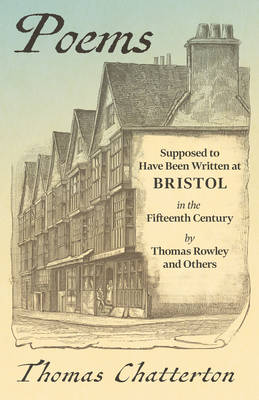
- Afhalen na 1 uur in een winkel met voorraad
- Gratis thuislevering in België vanaf € 30
- Ruim aanbod met 7 miljoen producten
- Afhalen na 1 uur in een winkel met voorraad
- Gratis thuislevering in België vanaf € 30
- Ruim aanbod met 7 miljoen producten
Zoeken
Poems
Supposed to Have Been Written at Bristol, in the Fifteenth Century, by Thomas Rowley and Others
Thomas Chatterton
Paperback | Engels
€ 29,95
+ 59 punten
Omschrijving
In 1763, an 11-year-old boy named Thomas Chatterton began publishing mature works of poetry. Before long, he was fooling the literary world by passing his work off as that of a non-existent 15th-century poet named Thomas Rowley--which he did until unmasked by Horace Walpole. Brought up in poverty and without a father, he studied furiously and went on to try and earn a living from his writing. After impressing the likes of the Lord Mayor, William Beckford and the radical leader John Wilkes, he eagerly looked for an outlet in London for his political works, but was unable to make a decent living and, despairing, poisoned himself at the age of seventeen. Chatterton had a significant impact on Romantic artists including Coleridge, Wordsworth, Shelley, and Keats; with numerous notable poems, plays, and paintings having been dedicated to him since his untimely death. This volume contains Chatterton's controversial collection of poetry by the invented Thomas Rowley, which was not discovered to be a fake until after he died. Contents include: "Preface", "Introductory Account of the Several Pieces Contained in this Volume", "Eclogue the First", "Eclogue the Second", "Eclogue the Third", "Elinoure and Juga", "To Johne Ladgate", "Songe to Ælla, Lorde of the Castel of Brystowe Ynne Daies of Yore", "Lydgate's Answer", "The Tournament. An Interlude", "Bristowe Tragedie Or, the Dethe of Syr Charles Bawdin", etc. As part of our poetry imprint, "Ragged Hand", Read & Co. is republishing this classic collection of poetry now in a new edition complete with John Keats' "Sonnet to Chatterton" (1848).
Specificaties
Betrokkenen
- Auteur(s):
- Uitgeverij:
Inhoud
- Aantal bladzijden:
- 244
- Taal:
- Engels
Eigenschappen
- Productcode (EAN):
- 9781528717199
- Verschijningsdatum:
- 26/05/2020
- Uitvoering:
- Paperback
- Formaat:
- Trade paperback (VS)
- Afmetingen:
- 140 mm x 216 mm
- Gewicht:
- 312 g

Alleen bij Standaard Boekhandel
+ 59 punten op je klantenkaart van Standaard Boekhandel
Beoordelingen
We publiceren alleen reviews die voldoen aan de voorwaarden voor reviews. Bekijk onze voorwaarden voor reviews.








